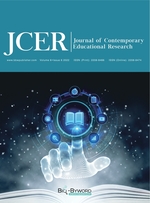Abstract
This paper attempts to summarize a number of research studies on numbers. The purpose of this study was to investigate and identify the obstacles encountered by students when they are dealing with number reasoning (whole numbers, integers, and rational numbers) and the difficulties faced by pre-service teachers in teaching arithmetic, including their misconceptions and weaknesses when they teach arithmetic and operations. There are two main sections in this paper: students’ cognitive obstacles for number reasoning, and pre-service teachers’ misconceptions of arithmetic. With the summarized misconceptions and obstacles of both, students and teachers, this paper provides efficient and effective thinking strategies that may help both, learners and instructors overcome obstacles, revise misconceptions, and strengthen their understanding, in order to develop proficiency in number reasoning and arithmetic operations.
References
National Council of Teachers of Mathematics, 2000, Principles and Standards for School Mathematics, National Council of Teachers of Mathematics, Reston, VA.
De Morgan A, 1902, On the Study and Difficulties of Mathematics (2nd Edition), Open Court, Chicago, IL.
Fauvel J, van Maanen J, 2000, History in Mathematics Education: An ICMI Study, Kluwer, Dordrecht, Netherlands.
Bishop J, Lamb L, Philipp R, et al., 2014, Obstacles and Affordances for Integer Reasoning: An Analysis of Children’s Thinking and the History of Mathematics. Journal for Research in Mathematics Education, 45(1): 19–61. https://doi.org/10.5951/jresematheduc.45.1.0019
Mack N, 1995, Confounding Whole-Number and Fraction Concepts When Building on Informal Knowledge. Journal for Research in Mathematics Education, 26(5): 422–441. https://doi.org/10.2307/749431
Hunting R, Davis G, Pearn C, 1996, Engaging Whole-Number Knowledge for Rational-Number Learning Using a Computer-Based Tool. Journal for Research in Mathematics Education, 27(3): 354–379. https://doi.org/10.2307/749369
Gallardo A, 1995, Proceedings of the Seventeenth Annual Meeting of the North American Chapter of the International Group for the Psychology of Mathematics Education, October 21–24, 1995: Negative Numbers in the Teaching of Arithmetic: Repercussions in Elementary Algebra. Education Resources Information Center, Columbus, OH, 158–163.
Empson SB, Levi L, 2011, Extending Children’s Mathematics: Fractions and Decimals, Heinemann, Ports- mouth, NH.
Hefendehl-Hebeker L, 1991, Negative Numbers: Obstacles in Their Evolution from Intuitive to Intellectual Constructs. For the Learning of Mathematics, 11(1): 26–32.
Ball D, 1993, With an Eye on the Mathematical Horizon: Dilemmas of Teaching Elementary School Mathematics. The Elementary School Journal, 93(4): 373–397.
Lo J, Grant T, Flowers J, 2008, Challenges in Deepening Prospective Teachers’ Understanding of Multiplication Through Justification. Journal of Mathematics Teacher Education, 11(1): 5–22. https://doi.org/10.1007/s10857-007-9056-6
Thanheiser E, Whitacre I, Roy G, 2014, Mathematical Content Knowledge for Teaching Elementary Mathematics: A Focus on Whole-Number Concepts and Operations. The Mathematics Enthusiast, 11(2): 217–266. https://pdxscholar.library.pdx.edu/cgi/viewcontent.cgi?article=1082&context=mth_fac
Harkness S, Thomas J, 2008, Reflections on “Multiplication as Original Sin”: The Implications of Using a Case to Help Preservice Teachers Understand Invented Algorithms. The Journal of Mathematical Behavior, 27(2): 128–137. https://doi.org/10.1016/j.jmathb.2008.07.004
Carpenter TP, Franke M, Levi L, 2003, Thinking Mathematically: Integrating Arithmetic and Algebra in Elementary School, Heinemann, Portsmouth, NH.
Chapman O, 2007, Facilitating Preservice Teachers’ Development of Mathematics Knowledge for Teaching Arithmetic Operations. Journal of Mathematics Teacher Education, 10(4–6): 341–349. https://doi.org/10.1007/s10857-007-9046-8
Thanheiser E, 2009, Preservice Elementary School Teachers’ Conceptions of Multidigit Whole Numbers. Journal for Research in Mathematics Education, 40(3): 251–281. http://www.jstor.org/stable/40539337
Yackel E, Underwood D, Elias N, 2007, Mathematical Tasks Designed to Foster a Reconceptualized View of Early Arithmetic. Journal of Mathematics Teacher Education, 10(4–6): 351–367. https://doi.org/10.1007/s10857-007-9044-x
Green M, Piel J, Flowers C, 2010, Reversing Education Majors’ Arithmetic Misconceptions with Short-Term Instruction Using Manipulatives. The Journal of Educational Research, 101(4): 234–242. https://doi.org/10.3200/JOER.101.4.234-242
Corwin RB, 1989, Multiplication as Original Sin. Journal of Mathematical Behavior, 8: 223–225.
National Research Council, 2001, Adding It Up: Helping Children Learn Mathematics, in Mathematics Learning Study Committee, Center for Education, Division of Behavioral and Social Sciences and Education, National Academy Press, Washington, DC.
